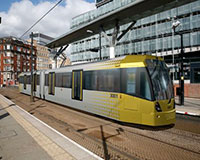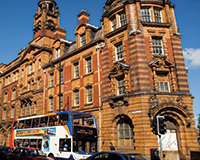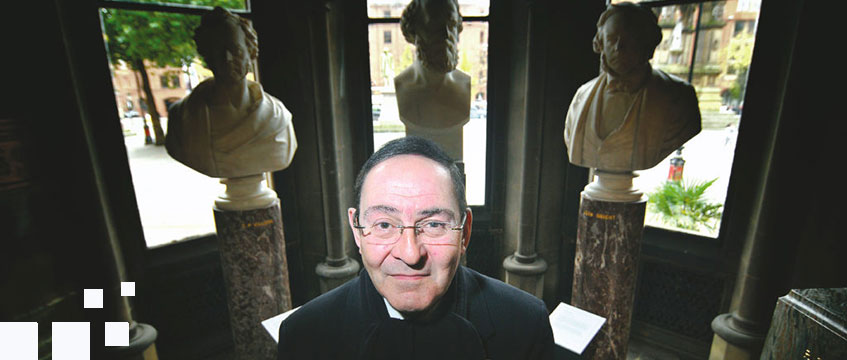Sir Howard Bernstein retires as Manchester City Council’s chief executive on 31 March after 45 years at the town hall (the last 19 as chief executive). In that time he has changed the face of the city – and of urban regeneration. He spoke to David Thame about the lessons learned.
Hulme
Project: The regeneration of an entire city district began in April 1992 with the award of £37.5m of City Challenge funding. The Crescents – notorious deck-access housing – were demolished and replaced as part of a £400m partnership.
“It was about a bold vision, and taking the residents with you, and that wasn’t easy. Hulme was about having a clear view on what makes a vibrant place – and it wasn’t just about knocking down the old deck-access housing but how you make a self-sustaining vibrant community – how you make a place. And there’s no quick fix for that and the proof is that the Hulme redevelopment has only just completed, with the final stages of the MMU Campus. Hulme was important because we all learned – public and private sector – how to work together to create a place, and it built confidence about co-operation on both sides.”
 Trams
Trams
Project: Metrolink has grown from a single line (Altrincham to Bury) in 1992 to today’s network of 93 stops and 34m passengers, spanning many Greater Manchester boroughs.
“Metrolink was perhaps one of the biggest challenges – not least because we built the first privatised railway the UK had seen for decades. It linked the north and south of the rail network, and the city centre, but we had a Conservative government that was not interested in public sector funding for this kind of project, so we created a new design, build and operate model – where the city owned the track. The Treasury were great proponents of what we were doing, the issue was selling this idea to the good people of Manchester. The trams – along with the airport – showed we could work with the private sector, but also bound the ten Greater Manchester councils much closer together.”
Northern Powerhouse
Project: Launched by George Osborne in 2014, this year will see the first major regional devolution in England as Manchester and other cities elect city-region mayors.
“If Manchester doesn’t succeed, the Northern Powerhouse can never deliver its full potential. But the Northern Powerhouse isn’t just Howard – it has taken years of arguing the case for city-regions by council leaders Graham Stringer and Richard Leese, and more recently George Osborne and the idea wouldn’t have got anywhere without George. As for the current government, the proof of the pudding is in the eating – and we’ll know whether they take it seriously when it comes to investing in big infrastructure projects like Leeds to Manchester rail links. Of course Manchester’s way isn’t the exclusive route to promote growth – though someone needs to explain to me what the Midlands Engine is.”
 The Royal Opera House
The Royal Opera House
Project: Attempts to lure the Royal Opera House to open a Manchester base came to grief in 2008. Now a £175m arts centre – The Factory – will be at the heart of Allied London’s St John’s district on the former Granada TV site.
“Getting the Royal Opera to come to Manchester was an extraordinarily brave project – and it just ran out of time in the final days of the Labour government. The 2008 financial crash didn’t help. Tony Hall [then ROH chief, now BBC director general] was very committed and Manchester never lost sight of the role of culture. Now we have the £175m Factory project under way and it’s the complete and total answer to the ROH issues. It will be at the heart of one of the great creative zones in the UK.”
Northern Quarter
Project: An appealing and eccentric mix of unreformable old Manchester and funky new Manchester focused on Oldham Street. A model for urban living, working and playing.
“Sometimes you just need to leave things alone. Let it grow but don’t intervene, let it develop its own identity and only step in to help the area avoid excessive developments, and we have had to step in to stop some developments that would not have fitted.”
Spinningfields
Project: A pathbreaking 22-acre, 4.5m sq ft office district developed in partnership with Allied London. Planning work began after the 1996 IRA terrorist bomb.
“Without an assertive city council, you can’t do schemes like this. We saw an opportunity to expand our financial and professional sector, and provide big floorplate offices, and we took it but using our landholdings and privately owned holdings. Spinningfields is without doubt one of the most significant platforms for growth in Manchester – our financial and professional services sector is much larger today than it was in 2006-7 before the crash, and the partnership with Allied London has been remarkably successful.”
 London Road fire station
London Road fire station
Project: A listed building, abandoned by the fire service in 1986, and by 2001 on the official buildings-at-risk register. A CPO attempt was resisted by owner Britannia Hotels in 2011. A second attempt was initiated in 2014 and in 2015 Britannia announced its intention to sell to Allied London. Redevelopment is now under way.
“Never give up is the lesson here. But it also exposes the frailties of the planning and development process. It was one of the experiences that bruised me most that it took such effort to secure a building, and that the planning inspector effectively bottled it. The landowners knew they wouldn’t get away with defending a compulsory purchase order twice. But it added five years to the process.”
East Manchester
Project: A mighty regeneration of 17 neighbourhoods over 4,500 acres. Regeneration was kick-started by Manchester’s second failed Olympic bid.
“Without the Olympic bids and the Commonwealth Games, we couldn’t easily access the resources to open up East Manchester – there’s absolutely no doubt about that. Those Olympic bids were where we all – private and public sector – learnt about the benefits of partnership and collaboration. They were hugely rewarding, we learnt to share our plans for our city, and it created a new identity and a new civic pride. We’re still following that approach 25 years later – it’s the most significant thing about how we do business. And Manchester got far more out of the Olympics than Barcelona, who actually won it [the bid to host the 1992 games].”











